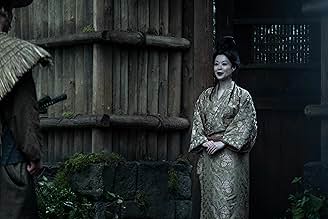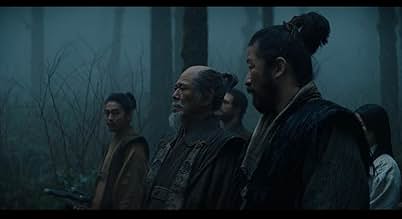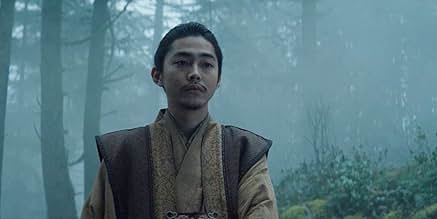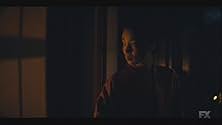A Stick of Time
- Folge lief am 2. Apr. 2024
- 16
- 55 Min.
IMDb-BEWERTUNG
8,3/10
9128
IHRE BEWERTUNG
Nachdem Toranagas Armee durch das Erdbeben dezimiert wurde, muss er einen alten Bekannten um Hilfe bitten.Nachdem Toranagas Armee durch das Erdbeben dezimiert wurde, muss er einen alten Bekannten um Hilfe bitten.Nachdem Toranagas Armee durch das Erdbeben dezimiert wurde, muss er einen alten Bekannten um Hilfe bitten.
Ryo Hayashida
- Tough Green Samurai
- (as Ryohei Hayashida)
Empfohlene Bewertungen
Ok, I'm older. I've read the book multiple times, I've seen the 80s miniseries 3 times. This isn't Clavell's Shogun.
This is GoT - lots of promise but crashing and burning.
This is Bram Stoker's Dracula - a much praised movie, that deviated massively from Bram Stoker's novel.
We have 3 episodes left? Maybe I missed it and there's a season 2 coming, but this series is losing me. Seems like the last few episodes, barring a few moments, is the same actors sitting around in the rain in Anjiro mildly plotting, going over the same nonsense over and over. Blackthorne whining about his ship, Buntaro whining about his wife & Blackthorne. Mariko being a grump about literally everything.
They've accomplished almost nothing since the daring escape from Osaka - Blackthorne is still a useless, whiny "barbarian" where in the book by this time, he's much more accomplished with his Japanese, has Samurai warriors, etc. Him and Mariko are firmly in love -
I could go on and on. This had a lot of promise but started falling apart a couple episodes ago.
This is GoT - lots of promise but crashing and burning.
This is Bram Stoker's Dracula - a much praised movie, that deviated massively from Bram Stoker's novel.
We have 3 episodes left? Maybe I missed it and there's a season 2 coming, but this series is losing me. Seems like the last few episodes, barring a few moments, is the same actors sitting around in the rain in Anjiro mildly plotting, going over the same nonsense over and over. Blackthorne whining about his ship, Buntaro whining about his wife & Blackthorne. Mariko being a grump about literally everything.
They've accomplished almost nothing since the daring escape from Osaka - Blackthorne is still a useless, whiny "barbarian" where in the book by this time, he's much more accomplished with his Japanese, has Samurai warriors, etc. Him and Mariko are firmly in love -
I could go on and on. This had a lot of promise but started falling apart a couple episodes ago.
First off, let's talk about the new player in town: Toranaga's brother. I was immediately intrigued by his arrival, and the way the episode builds up his presence before we even meet him is masterful. We've heard whispers of his influence and the potential threat he poses, so when he finally steps onto the stage, it feels like a momentous occasion. His interactions with Toranaga are fascinating to watch, as they're steeped in both familial tension and political calculation. The dynamic between the two brothers is a fresh and compelling addition to the series.
The stakes feel higher than ever, and there's a real sense of danger lurking beneath the surface. Toranaga's maneuvering, as he tries to anticipate and outmaneuver not just his brother, but also his other rivals, is brilliant to watch. It's like a high-stakes game of chess where every move counts, and one wrong step could lead to disaster. The tension is palpable, and I found myself on the edge of my seat, trying to predict who would come out on top.
The ending of the episode is particularly well-executed. Without giving too much away, let's just say that the final moments are both shocking and satisfying. There's a sense that the carefully laid plans of several characters are starting to unravel, and the consequences are going to be dire. The way the episode builds up to this climax is masterful, and the payoff is worth the wait. It's one of those endings that leaves you with your jaw on the floor, eager to see what happens next. I have to give credit to the writers and directors for pulling off such a tense and impactful conclusion. It's the kind of ending that reminds you why you're invested in the story and its characters in the first place.
However, as much as I enjoyed the episode, it's not without its flaws. The pacing, while generally good, does drag in certain parts. There are a few scenes that feel more like filler than necessary plot development, particularly some of the extended sequences with Anjin. Don't get me wrong, I appreciate the character-building moments, but there are times when it feels like the story is treading water instead of moving forward. Anjin's journey is important, and I understand the need to show his growing integration into Japanese society, but some of these scenes could have been trimmed down to keep the momentum going.
That said, these weaknesses don't overshadow the strengths of the episode. The arrival of Zataki adds a new layer of complexity to the story, and the political chess game between the brothers is gripping to watch. Overall, Episode 7 is a strong installment that successfully raises the tension and sets the stage for the conflicts to come.
The stakes feel higher than ever, and there's a real sense of danger lurking beneath the surface. Toranaga's maneuvering, as he tries to anticipate and outmaneuver not just his brother, but also his other rivals, is brilliant to watch. It's like a high-stakes game of chess where every move counts, and one wrong step could lead to disaster. The tension is palpable, and I found myself on the edge of my seat, trying to predict who would come out on top.
The ending of the episode is particularly well-executed. Without giving too much away, let's just say that the final moments are both shocking and satisfying. There's a sense that the carefully laid plans of several characters are starting to unravel, and the consequences are going to be dire. The way the episode builds up to this climax is masterful, and the payoff is worth the wait. It's one of those endings that leaves you with your jaw on the floor, eager to see what happens next. I have to give credit to the writers and directors for pulling off such a tense and impactful conclusion. It's the kind of ending that reminds you why you're invested in the story and its characters in the first place.
However, as much as I enjoyed the episode, it's not without its flaws. The pacing, while generally good, does drag in certain parts. There are a few scenes that feel more like filler than necessary plot development, particularly some of the extended sequences with Anjin. Don't get me wrong, I appreciate the character-building moments, but there are times when it feels like the story is treading water instead of moving forward. Anjin's journey is important, and I understand the need to show his growing integration into Japanese society, but some of these scenes could have been trimmed down to keep the momentum going.
That said, these weaknesses don't overshadow the strengths of the episode. The arrival of Zataki adds a new layer of complexity to the story, and the political chess game between the brothers is gripping to watch. Overall, Episode 7 is a strong installment that successfully raises the tension and sets the stage for the conflicts to come.
Matt Lambert must've gotten the short straw with the writing assignment for this episode. It's without question the worst out of all seven episodes to this point.
What was the directive here? Maybe something like, "lay waste to every plot and character arc that's been developed so far, and leave the viewers hanging for a sunny-sky resolution..."???
I've watched Sanada perform on screen since he was about 17 years old. In the first movie of his I saw, swinging on trees like a Jackie Chan aficionado, he had more certainty and chutzpah back then than what Lord Toranaga had in this episode.
The Brit sailor was right to tell everyone to go to hell when he walked out on their pointless ceremonial surrender. And what was the point of the Willow World Madam giving us an idea that she had something up her sleeve, some knowledge Toranaga had and which he wasn't sharing with anyone?
And what about the courtesan's desire to "take it to an elevated level" with the betrayer Saiko? She quickly exited. Not clear if she was involved in what happened next, or if she was saving her "elevation" techniques for another time.
I don't see how anything in this episode built on anything before it or leads to any good thing afterward. Basically, this was crummy writing 101. Which is a reflection of crummy thinking.
What was the directive here? Maybe something like, "lay waste to every plot and character arc that's been developed so far, and leave the viewers hanging for a sunny-sky resolution..."???
I've watched Sanada perform on screen since he was about 17 years old. In the first movie of his I saw, swinging on trees like a Jackie Chan aficionado, he had more certainty and chutzpah back then than what Lord Toranaga had in this episode.
The Brit sailor was right to tell everyone to go to hell when he walked out on their pointless ceremonial surrender. And what was the point of the Willow World Madam giving us an idea that she had something up her sleeve, some knowledge Toranaga had and which he wasn't sharing with anyone?
And what about the courtesan's desire to "take it to an elevated level" with the betrayer Saiko? She quickly exited. Not clear if she was involved in what happened next, or if she was saving her "elevation" techniques for another time.
I don't see how anything in this episode built on anything before it or leads to any good thing afterward. Basically, this was crummy writing 101. Which is a reflection of crummy thinking.
A Stick of Time, a new episode of Shogun, opens after a bloody battle, showcasing the show's unflinching portrayal of feudal carnage. The scene features battered corpses and close-up beheadings, but the viewer may feel let down when a man shouts "The war is over!" The show then reveals that the scene is the aftermath of Toranaga's first battle 46 years prior. The young warrior accepts his enemy's surrender and assists him with his seppuku. Toranaga's political maneuvers have been observed since Shogun's pilot episode, and this scene is possibly the most revealing of his character. Toranaga, a man with strong warrior instincts, seeks to make amends with his long-lost brother, Lord Saeki, but their rift is not due to lingering resentment. After a good-natured ribbing, Toranaga and Lord Saeki decide to let bygones be bygones. Toranaga still dislikes his "mongrel half-brother" and uses a tactic to win him over, using top-tier prostitutes. The Anjin is curious about his role in the Crimson Sky plan, but Blackthorne isn't shocked when Toranaga declines to divulge details. The exchange contributes to the mounting friction between these uneasy allies, as Toranaga has never been one to post his plans on a billboard. The Anjin's uneasy allies are influenced by the Anjin's refusal to disclose details, highlighting the tension between their uneasy allies. Omi, upset that Saeki is taking up Kiku's time, redirects his anger to Blackthorne, accusing him of soiling Gin's tea house. Gin, unperturbed, suggests Kiku is infatuated with someone else. The show's dynamic female character, Fuji, embodies the best traits of Toranaga, Blackthorne, and Mariko, providing the clearest thematic link between their storylines. Fuji's conflicting emotions remind us that she shares Blackthorne's courage and Toranaga's commitment to duty, while also possessing Mariko's knowledge of the futility of it all. Saeki publicly disrespects Toranaga, leading to an act of betrayal that makes a story of childhood incontinence look like kids' stuff. His official reasons for betraying his brother and nephew to the Council of Regents might be political, but it's clear that he was primarily motivated by old-fashioned sibling rivalry. Yabushige, who has been playing both sides of the fence, is also uncertain about his allegiances. Gin's wisdom and entrepreneurial ambition come to the fore as she shares her vision of a brighter future in which courtesans are unionized and allowed to work together in a centralized brothel district.
As a big fan of the book, I was concerned going into this. James Clavell's vision is so immersive, so precise, I didn't think the creators would pull off a faithful adaptation. Yet somehow, they did. I know Star Wars fans will see the word "somehow" and immediately downvote my review before reading the rest, but I can't help it. Magic can't be explained in the case of Shogun. It is one of the rawest and purest depiction of the time period I've personally seen on screen, and that is owed in no small part to the genius that is Hiroyuki Sanada. His involvement elevates this project to unspeakable heights. I know it sounds like I'm exaggerating, but this show has brought me so much joy. We are but a few episodes away from the finale but I can't forsee even the slightest dip in quality, because it's clear that Rachel Kondo and Justin Marks respect the source material but also have tremendous passion for the story they're telling. I'll admit that I'm bitter - Game of Thrones broke my heart. I've witnessed what happens when you stray from the source material and let your ego guide you. Thankfully, that isn't the case with Shogun. It saddens me that we won't get a season two, just because of how brilliant this gem of a show is. But hats off to both creators for respecting their audience's time. As it is now, Shogun is perfect to me and I have no doubt they'll stick the landing. It's a great year for TV...
Wusstest du schon
- WissenswertesA ri is a Japanese unit of measurement that is about 3.93 kilometers, or 2.44 miles. It is defined as the distance a person can walk in an hour at a reasonable pace.
- Zitate
Yoshii Toranaga: Why is it that only those who have never fought in a battle are so eager to be in one?
- SoundtracksThe Pull of Death
performed by Atticus Ross, Leopold Ross & Nick Chuba
Top-Auswahl
Melde dich zum Bewerten an und greife auf die Watchlist für personalisierte Empfehlungen zu.
Details
- Laufzeit55 Minuten
- Farbe
- Sound-Mix
- Seitenverhältnis
- 2.00 : 1
Zu dieser Seite beitragen
Bearbeitung vorschlagen oder fehlenden Inhalt hinzufügen






















